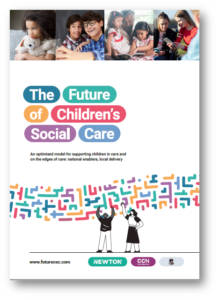
CCN Latest News, CCN News 2022 | 09 March 2022

With councils under significant pressure in delivering children’s social care – with many overspending each year – a report released today by the County Councils Network (CCN), Association of County Chief Executives, and Newton sets out a new way to improve outcomes for young people and make these vital services sustainable.
Analysis in The Future of Children’s Social Care shows that under current trends the number of children in care could rise to 95,000 by the end of 2025 with county leaders warning that the ‘status quo is no longer an option’. Based on case reviews with practitioners, the report finds up to 39% of children could have avoided coming into care had the system had worked differently and there was more support in place for families on the verge of crisis.
The report proposes a reshaped, family-focused way of delivering support, which aims to both reduce the number of children being placed in care and increase the number of children safely returning to their families and communities from care. But to enable this, the report outlines that sustainable local and national funding is vital to allow investment in services. Based on case reviews with practitioners, the report finds that for up to 34% of children in care, opportunities to support a return to family or community are not being properly explored.
 Last year, the government announced a review of children’s social care amidst rising costs for local authorities. Ahead of the review’s publication, today’s report concludes that local authorities should remain at the centre of a reshaped care system, because they are best placed to effectively co-ordinate change with public sector partners and across other service areas, such as adult social care.
Last year, the government announced a review of children’s social care amidst rising costs for local authorities. Ahead of the review’s publication, today’s report concludes that local authorities should remain at the centre of a reshaped care system, because they are best placed to effectively co-ordinate change with public sector partners and across other service areas, such as adult social care.
If the blueprint, called an ‘optimised delivery model’, is adopted across England by 2025, it could result in the following benefits:
A dedicated microsite for the report launch is here.
In putting together an ‘optimised model for children’s social care, Newton spoke with over 200 individuals, including those with experience in the care system and frontline practitioners. Their research also incorporated ‘deep dive’ reviews with six local authorities, and analysis of over 450,000 operational and financial local and national data sources.
To enable the new model, significant support is required from central government, including the certainty of a long-term funding settlement for children’s services, because addressing projected spend does not eradicate the underlying funding gap facing councils. CCN argues that the government should use its March Spring Forecast to inject substantive resources into the system.
The report recommends £205m a year is spent by councils in England on ‘edge of care’ services which would support those children and young people either at risk of coming into care or those who could return to their families and community, where it is safe to do so.
To achieve the best outcomes for children and young people, the report also recommends local and national investment to transform the care market, including a national focus on recruiting and supporting foster carers, similar to the government’s National Adoption Strategy, so there are more so there are more opportunities to place children in family-settings instead of costly residential care, when it is safe to do so..
The report examined individuals currently in care and found that in 54% of those cases local authorities had initially requested a different setting, such as a foster carer, but there was a lack of suitable alternatives.
Local authorities and public sector partners would also adopt a different approach to measuring risk – once which considers the later-life impacts of children being separated from their families against the short-term risks they face. Based on conversations with children and young people, the report also calls for a local and national focus on better collecting, recording, and measuring what most matters to them, such as, their contact time with siblings.
 Cllr Keith Glazier, Children’s Services Spokesperson for the County Councils Network, said:
Cllr Keith Glazier, Children’s Services Spokesperson for the County Councils Network, said:
“Councils can be proud of the support they give to thousands of young people, however we need to do more to maximise the opportunity for young people to be supported to live with their families or in their communities. With a deeper understanding of the long-term impact of children being separated from their families, it is clear that the status quo no longer an option.
“This report shows the art of the possible from both ends of the care system. It places councils at the centre of delivering a renewed system where the focus is on supporting children and families, enabling them to stay together, as well as maximising the possibility of children returning to their families where it is safe to do so.
“Of course, many young people will sadly still require local authority care, but under this new model thousands would not reach that point.
“The report throws down the gauntlet for local authorities to work more effectively, but it also shows how the rest of the public sector can be more joined up in supporting families on the verge of crisis, and in delivering meaningful support to reduce the need for lengthy periods in care: improving outcomes for children. However, this cannot be done on a shoestring and we urge for a substantial injection of funding from government this year so we can begin to transform services.”
 Luke Tregidgo, Director at Newton, said:
Luke Tregidgo, Director at Newton, said:
“Through this programme, we have spoken to over 200 people with experience of the care system including children, families, and practitioners. We have combined this with extensive analysis and deep dives in six local authorities to produce a sector-led vision and model of care that focusses on ensuring children and young people are safe, well, happy and have the foundations to thrive.
“ We hope this will offer leaders both locally and nationally the opportunity to consider their role in creating a future for children’s social care which achieves this ambitious vision.”
© 2024 County Councils Network | Credits | Site map | Cookies | Privacy Policy.